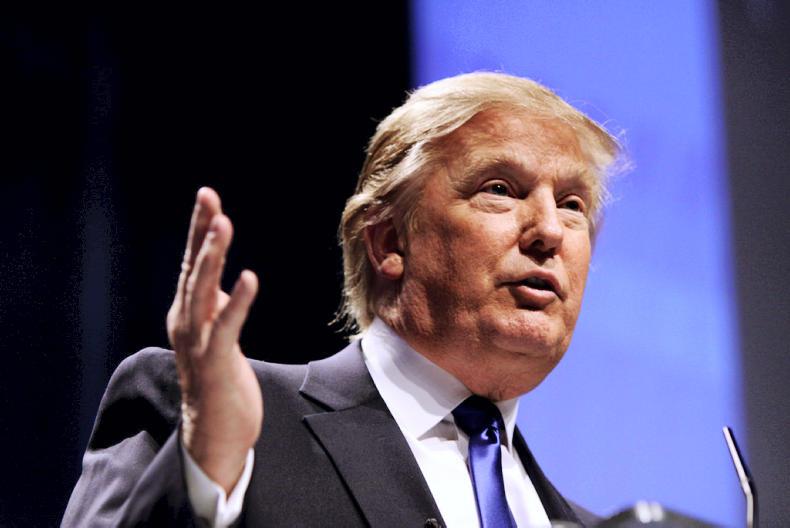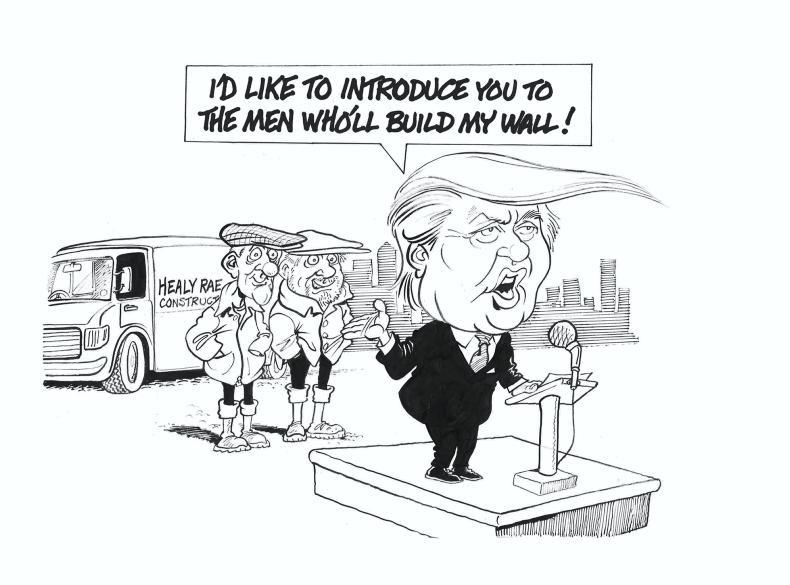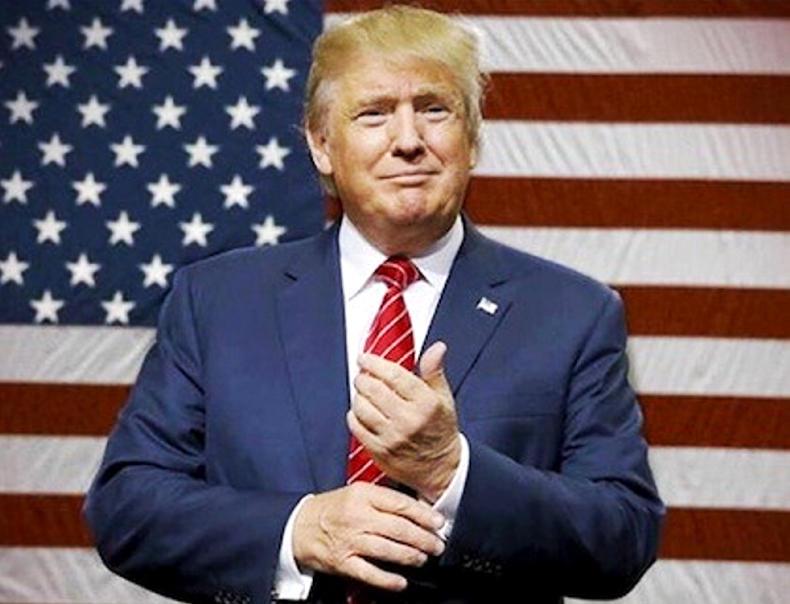The standout pledge during Donald Trump’s election campaign was to build a wall along the US-Mexico border.
A year on and no wall has been constructed but Trump remains adamant it will be built before the end of his presidency. For Trump and his supporters, the wall symbolises his commitment to stamp out Mexican immigration into the US, along with a desire to reduce the $64bn trade deficit the US has with its southern neighbour.
Trump has already tasked his trade secretary Robert Lighthizer with renegotiating the North American Free Trade Agreement (NAFTA) to more favourable terms to reflect the economic muscle of the US.
This process is ongoing but concerns are growing that the gulf in positions may be too wide to gap.
While the $64bn trade deficit might make the president’s eyes water, Mexico imported $18bn of US agricultural products last year, making it the third most important export market for US agriculture.
For US farmers, Mexico is the critical export market for cheese, corn, soya beans, pork and beef.
The immigrant conundrum in the US always raises the question of the country’s dependence on immigrant labour from Mexico.
Over half of the cows in the US are milked by Hispanic labour, while nearly all the fruit, vegetables, nuts and tobacco produced in the US are harvested by Mexican labourers allowed into the US on H2A temporary work visas.
For US farmers, nearly all of whom voted for Trump, an end to the H2A temporary work visa would be disastrous for their businesses. In 2016, almost 135,000 workers arrived in the US under the H2A agricultural worker visa, with over 90% of these coming from Mexico.

Given their dependence on Mexico as an export market for their produce and a source of farm labour, US farmers have been watching events surrounding the Nafta negotiations closely throughout 2017.
The general feeling among US farmers is that Sonny Perdue, who was appointed US secretary for agriculture by Donald Trump, has done a good job voicing farmer concerns around Mexico to the president.
Perdue has been energetic and proactive since taking office and US farmers feel he is the safe pair of hands they need to temper Trump’s aggressive stance with Mexico.
5: a victory for corn ethanol
Perhaps indicative of Sonny Perdue’s influence at the White House was President Trump’s personal intervention with the US Environmental Protection Agency (EPA) to maintain current biofuel quotas for all transportation fuel.
Trump’s intervention will not have pleased the Big Oil companies but it will have come as a boost to US corn farmers who benefit from the biofuels mandate, which requires 10% of all petrol and diesel fuel to be made from renewables, primarily corn-based ethanol.
6: the mood in Washington
Whenthe Irish Farmers Journal visited Washington DC in early 2017, the mood in the city was chaotic.
It was the early days of the Trump administration and the transition of staff was ongoing. In the US Department of Agriculture (USDA) for example, over 300 positions at the top of the department were vacated by Obama’s staff.
These key positions in the USDA were not filled until the end of the summer as new appointments have to be sworn in.
This slow transition is the same for all departments in Washington following a change of president.
As such, the new civil service is only getting started on implementing the policies of the new administration.
7: confidence restored in rural America
While significant challenges remain in rural America, the election of President Trump has certainly boosted confidence throughout the rural heartlands of the US, particularly among farmers.
This is most clearly illustrated in the strong growth in US milk volumes every month this year, while grain farmers in the US are also optimistic, judging by another bumper harvest for corn and soya beans. Trump’s hard line of cutting regulation and red tape has certainly been welcomed by farmers who felt threatened by growing environmental regulations under the Obama administration.

8: retreat from globalisation
Trump has consistently blamed globalisation and bad trade deals as the primary reason for the decline in US manufacturing in places like the rustbelt.
One of his first acts after taking office was to withdraw the US from the Trans-Pacific Partnership (TPP), while TTIP negotiations with Europe have gone into deep freeze. These protectionist moves mean the US has become more inward looking and is retreating from its position as the flag bearer for globalisation.
9: mood in US agribusiness
For US agriculture, trade on the global market has become increasingly important. While the US domestic market is enormous, it is also mature. Many US agribusiness were dismayed to see the US pull out of the TPP agreement as it would have provided direct access to some of the fastest-growing economies in the world.
At the same time, export competitors in Europe and South America are taking advantage of new trade deals to steal a march on US exporters in key markets. US agribusinesses are particularly concerned to see President Trump upsetting old trade alliances at the same time as the EU is negotiating trade deals in key markets such as Canada, Mexico and Japan.
The other impact of President Trump’s protectionist approach to global politics is the chance it affords to China.
The US may still be the world’s largest economy but Xi Jinping is undoubtedly now the world’s most powerful leader. Having recently consolidated power in his own party, Xi Jinping continues to build China’s sphere of influence on the global stage.
In contrast, Donald Trump’s preference for an America-first style nationalism has served to weaken US influence on the global stage and upset many long-standing allies.
The waning US influence on the global stage has also served to embolden Russian president Vladimir Putin, evidenced by Russia’s meddling in the US presidential election.
Read more
All we have written on the great Donald Trump
The standout pledge during Donald Trump’s election campaign was to build a wall along the US-Mexico border.
A year on and no wall has been constructed but Trump remains adamant it will be built before the end of his presidency. For Trump and his supporters, the wall symbolises his commitment to stamp out Mexican immigration into the US, along with a desire to reduce the $64bn trade deficit the US has with its southern neighbour.
Trump has already tasked his trade secretary Robert Lighthizer with renegotiating the North American Free Trade Agreement (NAFTA) to more favourable terms to reflect the economic muscle of the US.
This process is ongoing but concerns are growing that the gulf in positions may be too wide to gap.
While the $64bn trade deficit might make the president’s eyes water, Mexico imported $18bn of US agricultural products last year, making it the third most important export market for US agriculture.
For US farmers, Mexico is the critical export market for cheese, corn, soya beans, pork and beef.
The immigrant conundrum in the US always raises the question of the country’s dependence on immigrant labour from Mexico.
Over half of the cows in the US are milked by Hispanic labour, while nearly all the fruit, vegetables, nuts and tobacco produced in the US are harvested by Mexican labourers allowed into the US on H2A temporary work visas.
For US farmers, nearly all of whom voted for Trump, an end to the H2A temporary work visa would be disastrous for their businesses. In 2016, almost 135,000 workers arrived in the US under the H2A agricultural worker visa, with over 90% of these coming from Mexico.

Given their dependence on Mexico as an export market for their produce and a source of farm labour, US farmers have been watching events surrounding the Nafta negotiations closely throughout 2017.
The general feeling among US farmers is that Sonny Perdue, who was appointed US secretary for agriculture by Donald Trump, has done a good job voicing farmer concerns around Mexico to the president.
Perdue has been energetic and proactive since taking office and US farmers feel he is the safe pair of hands they need to temper Trump’s aggressive stance with Mexico.
5: a victory for corn ethanol
Perhaps indicative of Sonny Perdue’s influence at the White House was President Trump’s personal intervention with the US Environmental Protection Agency (EPA) to maintain current biofuel quotas for all transportation fuel.
Trump’s intervention will not have pleased the Big Oil companies but it will have come as a boost to US corn farmers who benefit from the biofuels mandate, which requires 10% of all petrol and diesel fuel to be made from renewables, primarily corn-based ethanol.
6: the mood in Washington
Whenthe Irish Farmers Journal visited Washington DC in early 2017, the mood in the city was chaotic.
It was the early days of the Trump administration and the transition of staff was ongoing. In the US Department of Agriculture (USDA) for example, over 300 positions at the top of the department were vacated by Obama’s staff.
These key positions in the USDA were not filled until the end of the summer as new appointments have to be sworn in.
This slow transition is the same for all departments in Washington following a change of president.
As such, the new civil service is only getting started on implementing the policies of the new administration.
7: confidence restored in rural America
While significant challenges remain in rural America, the election of President Trump has certainly boosted confidence throughout the rural heartlands of the US, particularly among farmers.
This is most clearly illustrated in the strong growth in US milk volumes every month this year, while grain farmers in the US are also optimistic, judging by another bumper harvest for corn and soya beans. Trump’s hard line of cutting regulation and red tape has certainly been welcomed by farmers who felt threatened by growing environmental regulations under the Obama administration.

8: retreat from globalisation
Trump has consistently blamed globalisation and bad trade deals as the primary reason for the decline in US manufacturing in places like the rustbelt.
One of his first acts after taking office was to withdraw the US from the Trans-Pacific Partnership (TPP), while TTIP negotiations with Europe have gone into deep freeze. These protectionist moves mean the US has become more inward looking and is retreating from its position as the flag bearer for globalisation.
9: mood in US agribusiness
For US agriculture, trade on the global market has become increasingly important. While the US domestic market is enormous, it is also mature. Many US agribusiness were dismayed to see the US pull out of the TPP agreement as it would have provided direct access to some of the fastest-growing economies in the world.
At the same time, export competitors in Europe and South America are taking advantage of new trade deals to steal a march on US exporters in key markets. US agribusinesses are particularly concerned to see President Trump upsetting old trade alliances at the same time as the EU is negotiating trade deals in key markets such as Canada, Mexico and Japan.
The other impact of President Trump’s protectionist approach to global politics is the chance it affords to China.
The US may still be the world’s largest economy but Xi Jinping is undoubtedly now the world’s most powerful leader. Having recently consolidated power in his own party, Xi Jinping continues to build China’s sphere of influence on the global stage.
In contrast, Donald Trump’s preference for an America-first style nationalism has served to weaken US influence on the global stage and upset many long-standing allies.
The waning US influence on the global stage has also served to embolden Russian president Vladimir Putin, evidenced by Russia’s meddling in the US presidential election.
Read more
All we have written on the great Donald Trump








 This is a subscriber-only article
This is a subscriber-only article











SHARING OPTIONS: